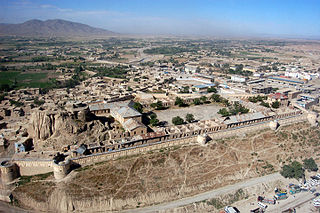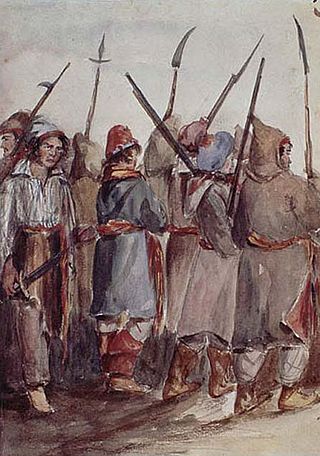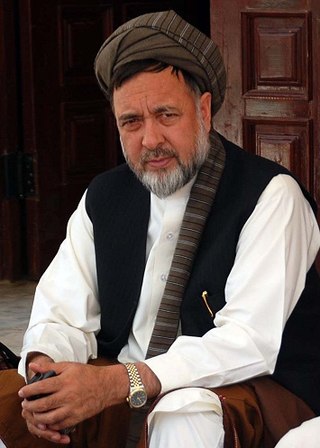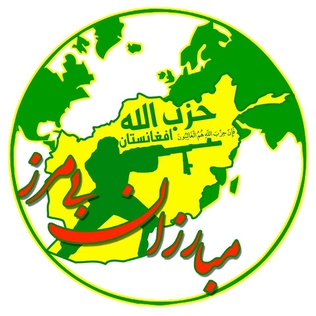Afghanistan

Night letters have been a tactic employed by the Taliban and other extremist groups in Afghanistan to intimidate supporters of secular government and education. [1]
A night letter is an unsigned leaflet distributed clandestinely.

Night letters have been a tactic employed by the Taliban and other extremist groups in Afghanistan to intimidate supporters of secular government and education. [1]
A shabnama (Persian : شبنامه, lit. 'night letter') is a pamphlet communicating warnings or direction, which are surreptitiously distributed. [2] Shabnama have been found throughout Iranian history. Shabnameh were widely distributed in the 20th century in Iran over the course of several revolutionary movements. An early 20th century example would be following the Persian Constitutional Revolution, when shabnameh were distributed in Tehran decrying the occupation of parts of Iranian territory by Russian troops, [3] and against the changing of the legal examination laws. [4]
In the late 1970s, Israeli peace activists belonging to the Shelly Party, a small left-wing party then holding two seats in the Knesset, distributed numerous such night letters in the postboxes of Tel Aviv houses. The leaflets contained eye-witness testimonies on severe human rights violations committed by IDF soldiers in the Occupied Territories, whose publication was forbidden by the military censorship. The leaflets were unsigned and at the time the party denied any connection with them. Only many years later did Uri Avnery, at the time Knesset member for Shelly, admit to having composed the leaflets and organised their distribution, stating that this act was justified since the censorship had abused its power to withhold information from the public.

The history of Afghanistan, preceding the establishment of the Emirate of Afghanistan in 1823 is shared with that of neighbouring Iran, central Asia and Indian subcontinent. The Sadozai monarchy ruled the Afghan Durrani Empire, considered the founding state of modern Afghanistan.

The Taliban, which also refers to itself by its state name, the Islamic Emirate of Afghanistan, is a militant Pashtun nationalist organization in Afghanistan with close ties to Deobandi Islamic fundamentalism. It ruled approximately three-quarters of the country from 1996 to 2001, before being overthrown following the American invasion. It recaptured Kabul on 15 August 2021 following the departure of most coalition forces, after nearly 20 years of insurgency, and currently controls all of the country. However, its government is not recognized by any country. The Taliban government has been internationally condemned for restricting human rights in Afghanistan, including the right of women and girls to work and to have an education.

Gardez is the capital of the Paktia Province of Afghanistan. The population of the city was estimated to be ca. 10,000 in the 1979 census and was estimated to be 70,000 in 2008. The majority of the city's native population is Pashtun. The city of Gardez is located at the junction between two important roads that cut, through a huge alpine valley. Surrounded by the mountains and deserts of the Hindu Kush, which boil up from the valley floor to the north, east and west, it is the axis of commerce for a huge area of eastern Afghanistan and has been a strategic location for armies throughout the country's long history of conflict. Observation posts built by Alexander the Great are still crumbling on the hilltops just outside the city limits. The city of Gardez has a population of 70,641. It has 13 districts and a total land area of 6,174 hectares (23.84 sq mi). The total number of dwellings in this city is 7,849.

Mullah is an honorific title for Shia and Sunni Muslim clergy and it is also an honorific title for a Muslim mosque leader. The term is also sometimes used for a person who has higher education in Islamic theology and sharia law.

Tajik, also called Tajiki Persian or Tajiki, is the variety of Persian spoken in Tajikistan and Uzbekistan by Tajiks. It is closely related to neighbouring Dari of Afghanistan with which it forms a continuum of mutually intelligible varieties of the Persian language. Several scholars consider Tajik as a dialectal variety of Persian rather than a language on its own. The popularity of this conception of Tajik as a variety of Persian was such that, during the period in which Tajik intellectuals were trying to establish Tajik as a language separate from Persian, prominent intellectual Sadriddin Ayni counterargued that Tajik was not a "bastardised dialect" of Persian. The issue of whether Tajik and Persian are to be considered two dialects of a single language or two discrete languages has political sides to it.

Ghazni, historically known as Ghaznain (غزنين) or Ghazna (غزنه), also transliterated as Ghuznee, and anciently known as Alexandria in Opiana, is a city in southeastern Afghanistan with a population of around 190,000 people. The city is strategically located along Highway 1, which has served as the main road between Kabul and Kandahar for thousands of years. Situated on a plateau at 2,219 metres (7,280 ft) above sea level, the city is 150 kilometres (93 mi) south of Kabul and is the capital of Ghazni Province. The name Ghazni drives from the Persian word ganj ‘treasure’.

Badakhshan Province is one of the 34 provinces of Afghanistan, located in the northeastern part of the country. It is bordered by Tajikistan's Gorno-Badakhshan in the north and the Pakistani regions of Lower and Upper Chitral and Gilgit-Baltistan in the southeast. It also has a 91-kilometer (57-mile) border with China in the east.

Islam in Afghanistan began to be practiced after the Arab Islamic conquest of Afghanistan from the 7th to the 10th centuries, with the last holdouts to conversion submitting in the late 19th century. It was generally accepted by local communities as a replacement of Zoroastrianism and Buddhism, local tribes began converting to the new religion. Islam is the official state religion of Afghanistan, with approximately 99.7% of the Afghan population being Muslim. Roughly 90% practice Sunni Islam, while around 10% are Shias. Most Shias belong to the Twelver branch and only a smaller number follow Ismailism.

Irregular military is any non-standard military component that is distinct from a country's national armed forces. Being defined by exclusion, there is significant variance in what comes under the term. It can refer to the type of military organization, or to the type of tactics used. An irregular military organization is one which is not part of the regular army organization. Without standard military unit organization, various more general names are often used; such organizations may be called a troop, group, unit, column, band, or force. Irregulars are soldiers or warriors that are members of these organizations, or are members of special military units that employ irregular military tactics. This also applies to irregular infantry and irregular cavalry units.

Haji Muhammad Mohaqiq is a politician in Afghanistan, who served as a member of the Afghanistan Parliament. He is also the founder and chairman of the People's Islamic Unity Party of Afghanistan. During the 1980s, he served with the mujahideen rebel forces fighting against the Soviet-backed Afghan government. After the withdrawal of the Soviet Union in 1989, Mohaqiq was appointed as the leader of the Hezb-e Wahdat for northern Afghanistan.

The Northern Alliance, officially known as the United Islamic National Front for the Salvation of Afghanistan, was a military alliance of groups that operated between late 1996 to 2001 after the Islamic Emirate of Afghanistan (Taliban) took over Kabul. The United Front was originally assembled by key leaders of the Islamic State of Afghanistan, particularly president Burhanuddin Rabbani and former Defense Minister Ahmad Shah Massoud. Initially, it included mostly Tajiks but by 2000, leaders of other ethnic groups had joined the Northern Alliance. This included Karim Khalili, Abdul Rashid Dostum, Abdullah Abdullah, Mohammad Mohaqiq, Abdul Qadir, Asif Mohseni, Amrullah Saleh and others.

Iranian nationalism refers to nationalism among the people of Iran and individuals whose national identity is Iranian. Iranian nationalism consists of political and social movements and sentiments prompted by a love for Iranian culture, Iranian languages and history, and a sense of pride in Iran and Iranian people. Whilst national consciousness in Iran can be traced back for centuries, nationalism has been a predominant determinant of Iranian attitudes mainly since the 20th century. Modern Iranian nationalism rose during the constitutional revolution. There began a refreshing atmosphere of unity and Iranian patriotic sentiments during the constitutional era. During the Pahlavi dynasty (1925–1979), Iranian nationalism experienced a resurgence due to the Pahlavi government's bolstering of patriotic sentiment.

Cinema was introduced to Afghanistan at the beginning of the 20th century. Political troubles slowed the industry over the years; however, numerous Pashto and Dari films have been made both inside and outside Afghanistan throughout the 20th century. The cinema of Afghanistan entered a new phase in 2001, but has failed to recover to its popular pre-war status.

Relations between Afghanistan and Iran were established in 1935 during King Zahir Shah's reign and the Shah of Iran Reza Shah Pahlavi, though ties between the two countries have existed for millennia. As a result, many Afghans speak Persian, as Dari is one of the official languages of Afghanistan, and many in Afghanistan also celebrate Nowruz, the Persian New Year.
The mass media in Afghanistan is monitored by the Ministry of Information and Culture (MoIC), and includes broadcasting, digital and printing. It is mainly in Dari and Pashto, the official languages of the nation. It was reported in 2019 that Afghanistan had over 107 TV stations and 284 radio stations, including 100s of print media and over 1,800 online media outlets. After the return of the Islamic Emirate of Afghanistan (IEA) in 2021, there was a concern that the mass media will significantly decrease in the country. The number of digital media outlets is steadily increasing with the help of Facebook, Instagram, TikTok, Twitter, YouTube, and other such online platforms. IEA's spokesman Zabihullah Mujahid suggested that the media should be in line with Sharia and national interests.

The Afghan conflict refers to the series of events that have kept Afghanistan in a near-continuous state of armed conflict since the 1970s. The country's instability began after the collapse of the Kingdom of Afghanistan in the 1973 coup d'état; with the overthrow of Afghan monarch Mohammad Zahir Shah, who had reigned for almost forty years, Afghanistan’s relatively peaceful period in modern history came to an end. However, all-out fighting did not erupt until after 1978, when the Saur Revolution overthrew the short-lived Republic of Afghanistan and established the Democratic Republic of Afghanistan. Subsequent unrest over the reforms that were being pushed by the then-ruling People's Democratic Party of Afghanistan (PDPA) led to unprecedented violence, prompting a large-scale pro-PDPA military intervention by the Soviet Union in 1979. In the ensuing Soviet–Afghan War, the anti-Soviet Afghan mujahideen received extensive support from Pakistan, the United States, and Saudi Arabia in a joint covert effort that was dubbed Operation Cyclone.

The Solar Hijri calendar is a solar calendar and one of the various Iranian calendars. It begins on the March equinox as determined by the astronomical calculation for the Iran Standard Time meridian and has years of 365 or 366 days. It is the modern principal calendar in Iran and is sometimes also called the Shamsi calendar and Khorshidi calendar. It is abbreviated as SH, HS or, by analogy with AH, AHSh.

Islamic Republic of Afghanistan nationality law is regulated by the Constitution of Afghanistan, as amended; the Citizenship Law of the Islamic Republic of Afghanistan and its revisions; the Afghan Civil Code; and various international agreements to which the country is a signatory. These laws determine who is, or is eligible to be, an Afghan national. The legal means to acquire nationality, formal legal membership in a nation, differ from the domestic relationship of rights and obligations between a national and the nation, known as citizenship. Nationality describes the relationship of an individual to the state under international law, whereas citizenship is the domestic relationship of an individual within the nation. Some countries use the terms nationality and citizenship as synonyms, despite their legal distinction and the fact that they are regulated by different governmental administrative bodies.
The politics of Afghanistan are based on a totalitarian emirate within the Islamic theocracy in which the Taliban Movement holds a monopoly on power. Dissent is not permitted, and politics are mostly limited to internal Taliban policy debates and power struggles. As the government is provisional, there is no constitution or other basis for the rule of law. The structure is autocratic, with all power concentrated in the hands of the supreme leader and his clerical advisors.

Hezbollah Afghanistan is a Shia Islamist political party in Afghanistan. It was originally founded in 1980 as a rebel group and part of the Tehran Eight, it fought with Iranian support in the Soviet–Afghan War. In 2005, it became a legal party, and in the 2010s it developed close connections with Liwa Fatemiyoun, a paramilitary force organized by Iran.